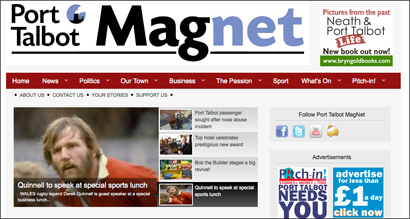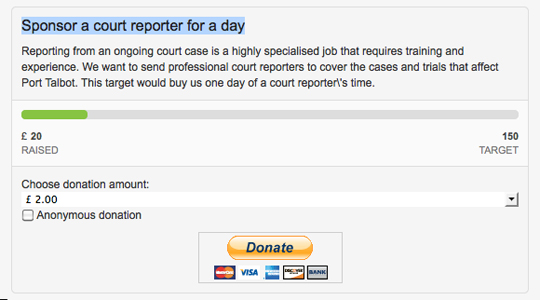The Port Talbot Magnet, a hyperlocal launched by a group of journalists six months ago, has been asking the community to fund stories in an bid to make the site sustainable.
One of those behind the hyperlocal, Rachel Howells, told Journalism.co.uk:
Last month we launched Pitch-In! which was our call to the community, to let them know that we are here and that we want to collaborate with them and we want them to be a part of the news service.
Pitch-in! follows crowdfunding initiatives such as Spot.us, based in the US, in asking readers and interested parties to donate money.
The Port Talbot Magnet is asking the community to meet targets to “sponsor our football results service”, “help us buy public liability insurance”, “sponsor a court reporter for a day” or contribute to the development fund or offer general support.
Howells, one of the directors of the Port Talbot Magnet, explained:
These are just a taste of what we would like to achieve. We have a long list of goals, including reporting council meetings and news, police and emergency services news, increasing our coverage of business news, sport, arts, music, entertainment, charity groups and campaigns – things we don’t have the resources for at the moment. And we are looking for local people to tell us what they would like us to cover, as well as giving journalists the opportunity to pitch in with ideas for investigations or news that they think should be covered.
A month on from launching Pitch-in! as a “call to community” and Howells said it has had “some success”, appearing to have generated around £40 in donations.
It’s a little more than we would have had if we hadn’t asked.
The Port Talbot Magnet is the result of cutbacks in South Wales and the closure of the Trinity Mirror-published Port Talbot Guardian, which shut in 2009.
A group of journalists, the majority of whom were members of the Swansea branch of the National Union of Journalists, started discussing how to “do something proactive to keep ourselves in journalism”.
Howells herself is former editor of Big Issue Cymru, who was made redundant when her job moved to Glasgow.
We could see there were changes in the industry that were particularly affecting Wales and that were affecting journalism generally.
As they were setting themselves up as a cooperative the group toyed with various ideas, settling for a news site for Port Talbot to fill the “natural vacuum” left by the closure of the local paper.
When the Port Talbot Guardian closed we just thought; here is a group of people who need local news, we are a group of journalists who want to provide it, surely there must be a way of filling the gap and creating some employment for ourselves as well.
The journalists’ joint effort developed into a local news site for the town of 35,000. Eight professional journalists are on the board of the Port Talbot Magnet, plus there are 20 “interested parties”, including academics and PRs.
The site launched in April 2011, in the same month as the Passion, a three-day play starring Michael Sheen, was performed in the local area and the hyperlocal became a community partner for the National Theatre Wales. Howells said this provided traffic and a “great test and great showcase” for the site.
Attempts to get public funding had proved unsuccessful, prompting the group to last month turn to community funding and also set up a membership scheme.
We can’t run it just as volunteers for ever, we want it to grow and develop, but we recognise that we can’t do it by ourselves.
Howells is hoping the community will answer the call, to subsidise the money generated through advertising.
Along with her role as journalist and director of the news site, Howells is also studying a funded PhD at Cardiff University, looking at what happens to a town that loses its local paper, the implications for democracy, and looking at possible sustainable business models. For obvious reasons her research is focused on Port Talbot.
Asked about her findings so far she explained it was too early to provide results from her research.
What I can tell you is that there were all these awful predictions that the number of local newspaper titles would drop significantly and that up until 2015 we were going to lose a percentage of them. This hasn’t happened at all and the number of closures has been minimal.
But underneath the surface though, when you look at the number of staff that have gone, if you look at how newspapers have merged with each other, the pagination of newspapers, there is an encroaching poverty in the newsgathering, particularly in this area.

